12 Best B2B eCommerce platforms 2022
According to Forrester, B2B eCommerce in the United States will reach $1.8 trillion by 2023. It will account for 17% of all B2B sales in the US and it will be growing by 10% annually over the next 5 years.
Actually, it’s not a surprise. Modern young entrepreneurs want to purchase products for their companies hassle-free like they shop for themselves—online. They don’t want to connect with dozens of suppliers, spend hours talking to them on the phone, and get buried under tons of accounting papers. B2B ecommerce software solutions can save entrepreneurs from this purchasing routine. That’s why B2B onlineshop software has become so popular.
In this article, we will give you a brief review of what the B2B eCommerce software is, examples of marketplaces and the best custom platforms for you to create a B2B marketplace or your own website. If you’re planning to start your business online, save this shortlist to test and choose the B2B online solution that fits your needs just right.
You may also be interested in how to open your B2B marketplace.
What is B2B eCommerce Software?
B2B marketplace is a particular case of eCommerce stores. B2B stands for business-to-business. These types of stores provide products and services for other businesses. eCommerce software is a platform which allows for creation of a website or marketplace. There is a special B2B eCommerce software solution.
Must-have features of a proper B2B onlineshop software
The business-to-business segment imposes special requirements for eCommerce stores. A B2B eCommerce solution provides a lot of opportunities when it has many handy features. They serve to automate the purchasing process for companies. So, when choosing a B2B onlineshop software, make sure it has these features at least:
- Flexible price formation tools. Companies usually buy a big number of products at once, and they buy regularly. It’s important to offer your purchasers quantity discounts and individual discounts based on their levels (tiers). The B2B eCommerce script should support user groups with different discounts and privileges and discounts that depend on how much a purchaser has already spent in your store.
- Easy price list downloading. Before ordering, a manager needs to obtain approval for the list of products and prices from the supervisor. So, the manager should be able to quickly download the price list with current prices.
- A convenient way of ordering products in bulk. A true B2B eCommerce software should offer a convenient interface for ordering products in bulk. Just imagine: you need to add 50 TV sets and 20 heating boilers of 3 different types to the cart. If a store doesn’t offer a convenient interface for this, you will spend hours just to fill the cart. Nobody likes wasting time, especially businessmen.
- Organizations inside a B2B eCommerce store. Normally, the purchasing process in companies involves more than one person. You need a feature that allows uniting users in organizations. This way, the owner of the organization could add more users to the organization in the store: managers, marketers, accountants. And they all could work in one account as different users.
- Close storefront for unauthorized users. You should be able to hide the catalog from prying eyes and check every registered purchaser manually. This will protect you from the nefarious activities of your competitors and enhance the moderation of new purchasers.
- Integrations with third-party services. Modern CRM, ERP, accounting, and analytics services can greatly improve your business performance. Make sure your future B2B eCommerce script has a powerful API and integrates with third-party business services.
- Convenient order placement. Some entrepreneurs are just not used to purchasing products for their companies through the webshop interface. They usually call and order via phone. In such cases, your manager creates an order in the admin panel. And it’s important that he or she can do it quickly talking to the customer on the phone.
- Easy reordering. What if a company buys consumables from you on a regular basis? Don’t make them form the order every time they shop on your eCommerce site. The company should be able to reorder the same products with the same number of items in just one click.
- Multiple storefronts. If you’re going to sell both to companies and individuals, the multi-store feature is a must for your online store. You should be able to configure your storefronts independently as if you run several different stores.
Best B2B platforms 2022
There are a lot of appealing eCommerce B2B solutions on the market. Yet, we analyze and compare the most interesting ones.
1. CS-Cart Ultimate
Apart from B2B eCommerce marketplace solution, CS-Cart has something to offer. There is a CS-Cart Ultimate. It is one of the best B2B eCommerce solutions, a self-hosted B2B eCommerce software for wholesalers and manufacturers of any size. The platform was released to the public in 2005 and now it powers over 35,000 B2C and B2B eCommerce websites worldwide. CS-Cart focuses on feature-richness and ease of use.
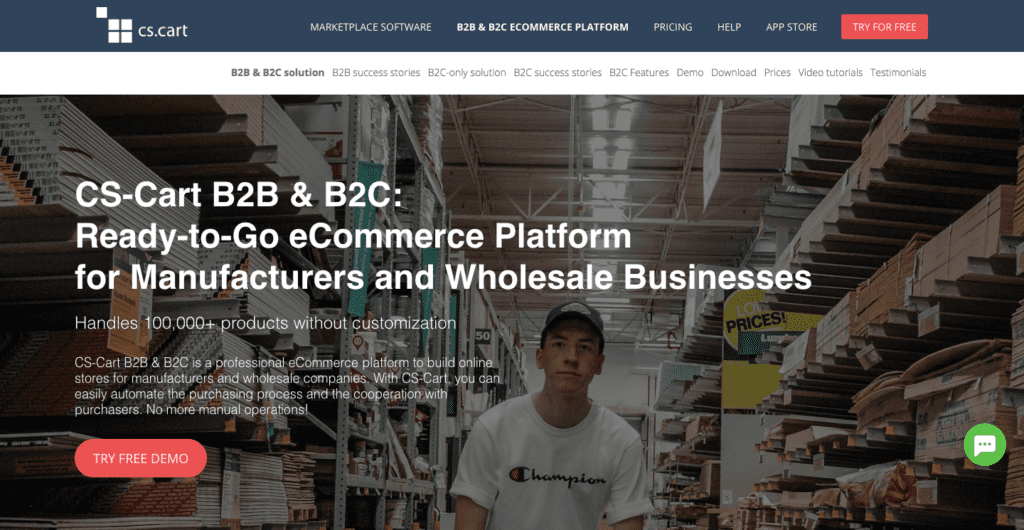
Since the CS-Cart wholesale eCommerce platform focuses on rich functionality, it has all the above-mentioned functions, plus more features to offer B2B buyers a true B2C shopping experience. CS-Cart’s powerful API allows integrating with many modern third-party CRM, ERP, accounting, and analytics systems so that you could build a perfectly working B2B ecosystem.
Also, CS-Cart Ultimate ships with an unlimited number of additional storefronts that can be configured independently. It means you can open B2B and B2C storefronts that will work and look differently, and manage them via a single admin panel.
CS-Cart is a self-hosted B2B eCommerce script, which means it could require some minor technical knowledge to be installed on a server. To make the onboarding easier, CS-Cart offers detailed documentation with installation instructions and server requirements. Thanks to its self-hosted nature, CS-Cart gives you full control over your B2B eCommerce store. You own it, not rent like you rent a SaaS solution.
CS-Cart users appreciate the ease of use and a great price/functionality ratio. They love its clean architecture and open-source code.
Capterra Rating: 4.6
2. Adobe Commerce (previously Magento)
Magento is an open-source B2B onlineshop software that was released in 2007. It has become one of the most popular eCommerce systems in the world, yet one of the most complex. The company started with B2C software and later was adapted for the B2B segment.
Magento is a very robust platform, which means you can customize it the way you want. This is a pro and a con at the same time. You can make your Magento-based B2B store extremely flexible and feature-rich but you will need a tech-savvy team of programmers to customize and support your store. And this means more spendings.
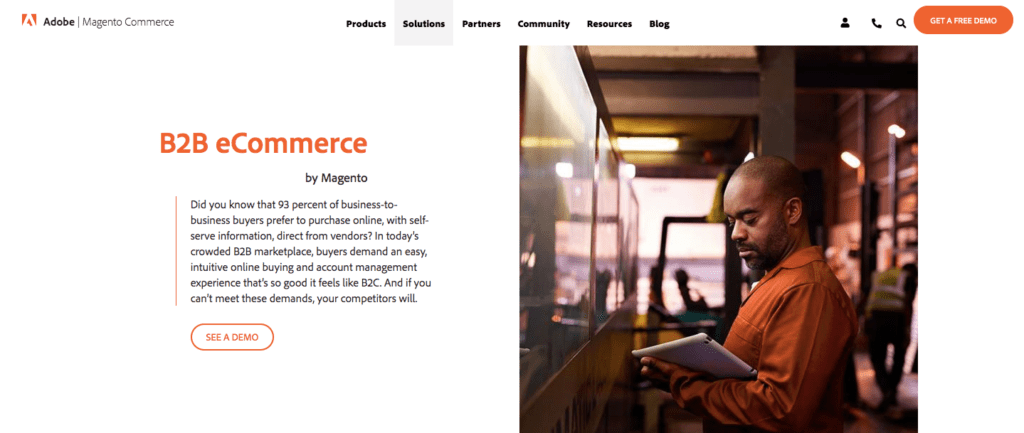
Capterra Rating: 4.3
3. BigCommerce B2B Ecommerce
BigCommerce was founded in 2009 as a SaaS B2B online solution. Its main advantages are hassle-free deployment (due to its cloud-based technology), powerful API, and the ability to run a hybrid business: to sell both to companies and individuals through a single website.
There are some restrictions though. For example, its cloud-based model doesn’t give users much freedom in customization. Plus, you will never get full control over your store and if something bad happens to BigCommerce, then this happens to your business, too.

It’s great that BigCommerce offers the ability to run a hybrid B2B and B2C business. You can create customer groups with different privileges dividing them into companies and individuals. But unlike CS-Cart, BigCommerce only lets you sell to both groups through the same storefront. And CS-Cart B2B&B2C supports multiple storefronts and you can create separate storefronts for B2B and B2C and make them work and look absolutely different.
BigCommerce is easier than Magento but it still requires some time to be mastered because of the feature complexity. Rich documentation greatly helps beginners to learn the platform.
Capterra Rating: 4.3
4. OROCommerce
OROCommerce is a true B2B eCommerce script that supports both B2C and B2B models. The developers say that their platform is even suitable for B2X scenarios. It’s a complex software and it is suitable for big wholesales companies and enterprises.
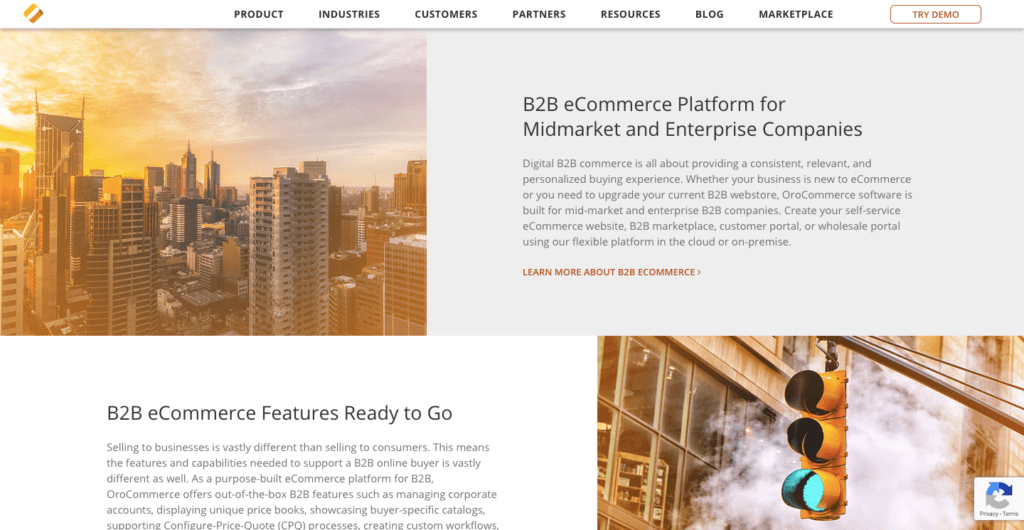
OROCommerce is one of the most flexible B2B online solutions on the market. It has all the must-have B2B features including corporate accounts, user roles, multiple price lists, a good API for integrating with business systems, a robust promotion system, buyer-specific catalogs and prices.
OROCommerce natively integrates with their own CRM system OROCRM that allows you to organize the customer contacts and arrange the customer interaction workflow. You’ll definitely need a CRM in your B2B store, so it’s a great built-in feature.
Capterra Rating: 4.7
5. 3dcart B2B e Commerce Solution
3dcart was released to the public in 2001. It is now a cloud-based eCommerce solution, which means it is easy to deploy and set up but difficult to modify and adapt to the business needs. They offer B2C and B2B e Commerce solutions.
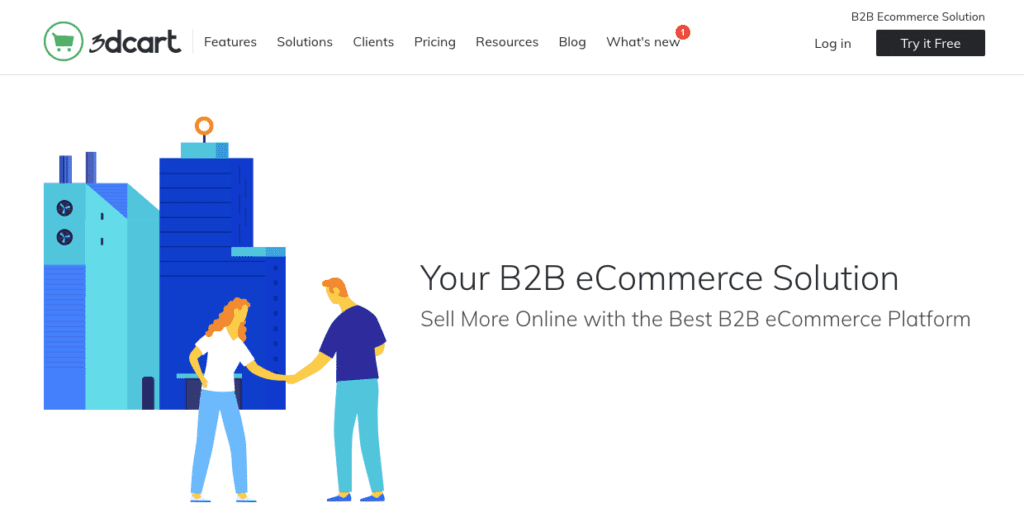
It’s pretty easy to launch a B2B shop on 3dcart B2B because it is cloud-based and doesn’t require technical skills to be deployed. Though it has the same restrictions as other SaaS platforms: it can’t offer you the same freedom and scalability as hosted solutions such as CS-Cart.
The cool thing about 3dcart is that it has almost all the must-have features for B2B customers mentioned above except for multiple storefronts and advanced price list management features.
Capterra Rating: 4.4
6. TradeGecko
TradeGecko is a B2B eCommerce script that focuses on the simplicity and automation of business-to-business sales. It is intended for high-growth wholesalers, distributors, eCommerce brands, and manufacturers. It is a cloud-based solution, which means fewer technical concerns but less control, too.
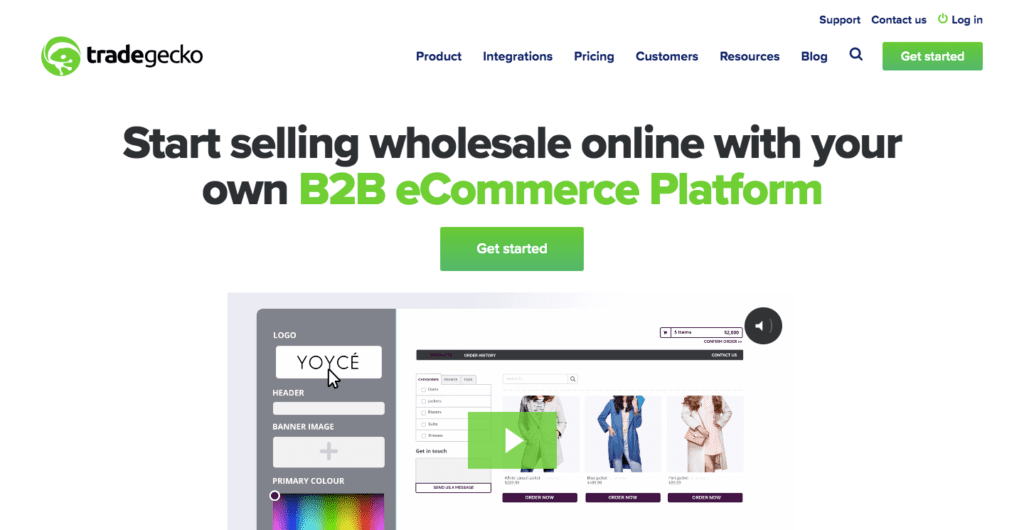
TradeGecko supports almost all must-have B2B features from our list: individual prices, custom price lists, the ability to hide products and prices from unauthorized users, easy ordering and reordering, warehouses, promotions, and more.
This solution has built-in reporting and analytics tools that allow you to better understand your processes and adjust them when necessary. The only thing that seems to be not included is a fully-functional multi-store feature for hybrid business models.
Most of the users are satisfied with TradeGecko and appreciate its simplicity and good customer support.
Capterra Rating: 4.4
7. X-Cart B2B eCommerce
X-Cart was released to the public in 2000 and it was the very first PHP shopping cart software. It’s developed by a Russian software development company that later released Ecwid. X-Cart offers both cloud and downloadable solutions, which is really good.
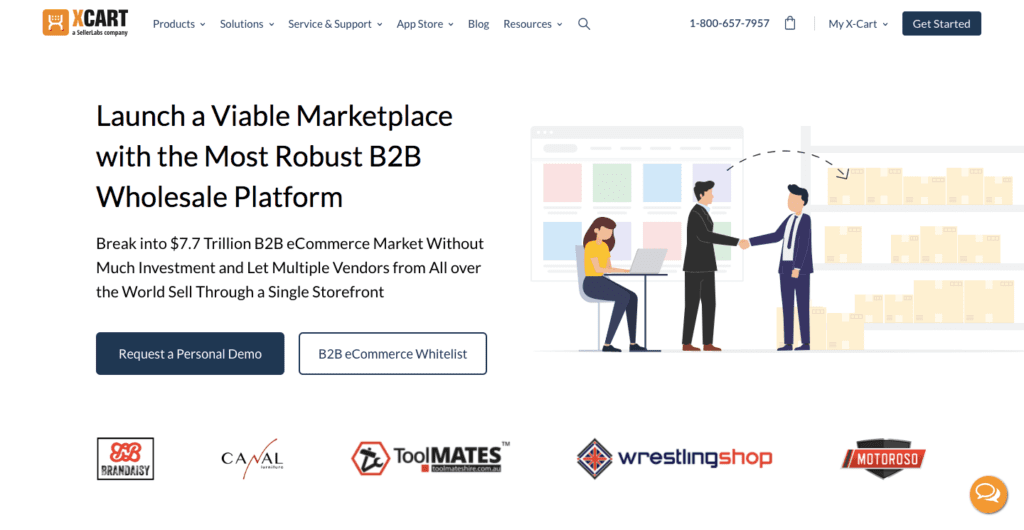
X-Cart is suitable for both B2C and B2B business models though there’s no clear division to B2C and B2B functionality. The solution has a robust vendor management system, promotions, a rating system, a payment distribution system, and other must-have features for any eCommerce store.
But what’s more important for a B2B e Commerce solution, X-Cart natively integrates with popular business systems such as nChannel and Segment. These integrations allow for building an effective B2B ecosystem around the platform.
The main con of X-Cart is that it doesn’t have enough B2B-specific features and multiple storefronts that could be used independently for B2C and B2B commerce. Looks like you’ll need to customize the platform to be able to use it for a complex B2B eCommerce shop.
Capterra Rating: 4.2
8. Optimizely
The basis of Optimizely for B2B is the InsiteCommerce. It is a specialized B2B onlineshop software for manufacturers and distributors. InsiteCommerce was founded in the United States in 1997. This is a SaaS platform, which means it is easy to deploy and maintain (the company does it for you) but it could be difficult to customize and scale.
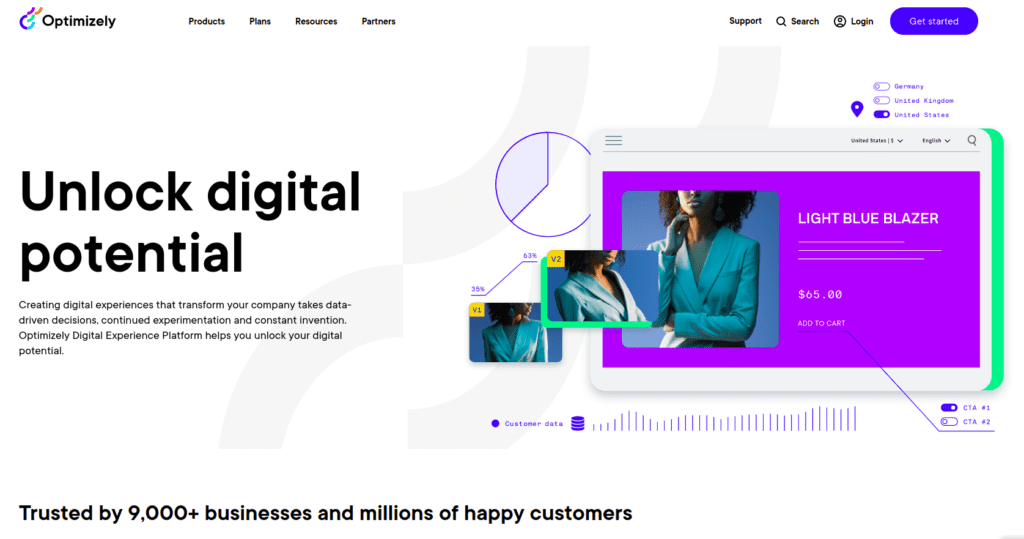
Optimizely relies on a powerful API, which allows you to integrate the platform with CRM and ERP systems. This B2B eCommerce script features some useful B2B functions such as fast reordering, advanced order management system with invoice generation and order statuses, the “Quotes” functionality, and built-in specific shipping options.
Unfortunately, this platform doesn’t have all the major B2B functions mentioned at the beginning of this article, so you might need to customize it by adding custom functionality. Taking into account its cloud-based technology, this could become a problem in the end. Hopefully, its “integration architecture” allows for some scaling.
Capterra Rating: 4.5
9. Pepperi
Pepperi is one of the best B2B eCommerce solutions, a platform for large businesses and enterprises. It is a cloud-based B2B eCommerce system with its pros and cons that we’ve already mentioned above: a SaaS eCommerce website is always easier to deploy and support but it is never under your full control.
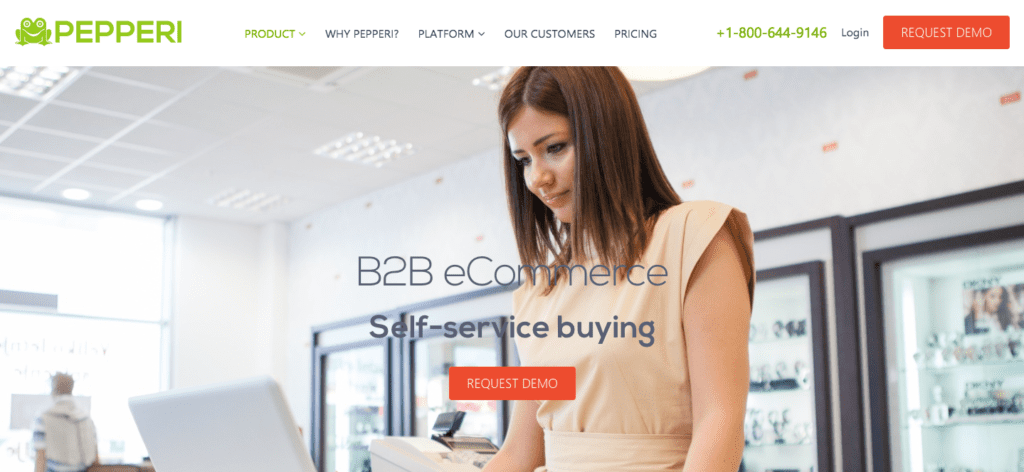
Pepperi is an omni-channel B2B online solution that easily integrates with CRM and ERP systems through a flexible API. It has lots of built-in features to offer B2C-like experience for wholesale customers: amazing catalog design, convenient payment and shipping options, special prices, price list management, notifications, and more.
One of the key features of Pepperi is its mobile friendliness. It offers native mobile apps for Android and iOS with offline data support. Users also praise Pepperi’s web and mobile interface.
Capterra Rating: 4.4
10. NetSuite SuitCommerce
SuiteCommerce by Oracle NetSuite is a B2B onlineshop software intended for companies that have multiple sales channels—online shops and brick-and-mortar stores. This is a feature-rich and complex system for large businesses and enterprises. The platform is cloud-based with its pros and cons.
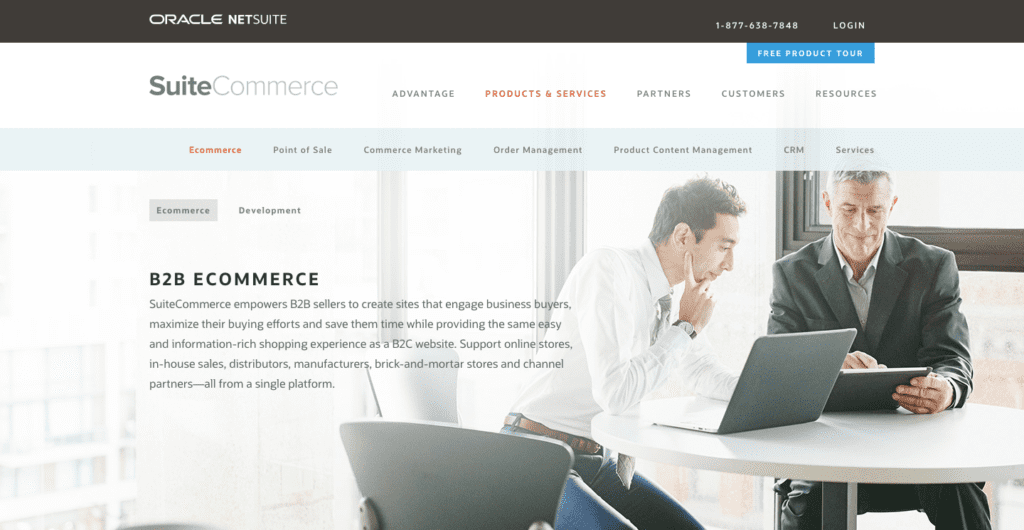
SuiteCommerce provides the ability to work on multiple channels. Users say it is very versatile and has powerful billing tools. It integrates with CRM, ERP and other business software, supports multiple stores, the quotes functionality, promotions, personal prices, and other must-have B2B functions.
The key feature of SuiteCommerce is its multi-channel nature. It allows you to connect an online store, a warehouse, a brick and mortar shop, distributors, manufacturers, and channel partners to a single ecosystem.
Capterra Rating: 4.1
11. Shopify Plus

When we are talking about a shopping cart solution e commerce B2B platform Shopify is the one worth mentioning. It is a popular Saas platform which has a lot of possibilities like powerful API or detailed analytics. There is a wide range of instructions: documentation, online private consultations and group ones. There is also a developed support. You can find information on how something works via chat or phone calls round-the-clock. They prefer working with power high-growth, high-volume enterprise businesses.
Capterra Rating: 4.8
12. Miva B2B onlineshop software
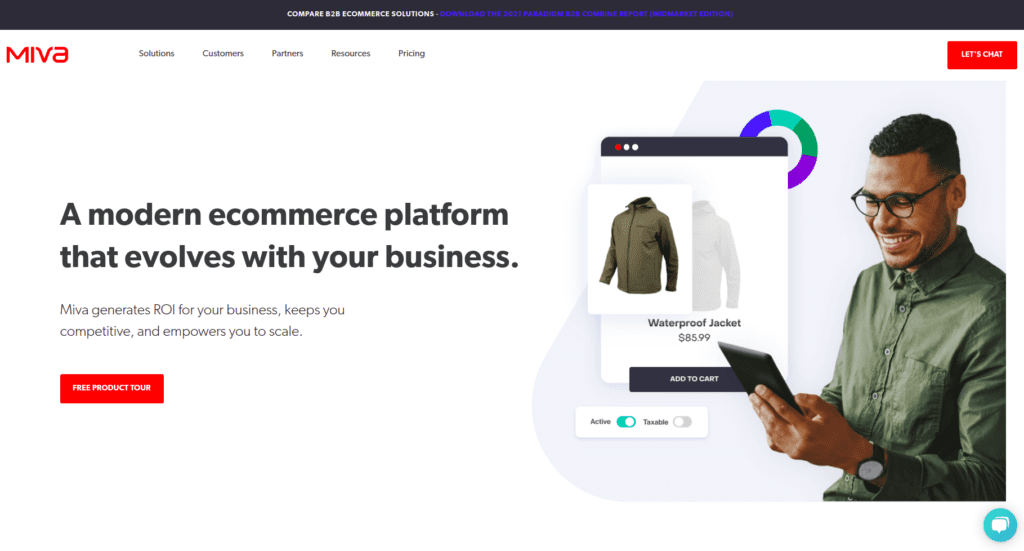
Miva is a good B2C and B2B online solution. It is suitable for middle-sized businesses and enterprises. This software is well-known for good customer services, feature variety, and relatively user-friendly interface.
Capterra Rating: 4.8
FAQ
How easy is it to integrate an ERP system with a B2B platform?
Any system such as ERP, CMS, CRM is very easy to integrate via the API—special built-in software tool.
Are there free B2B ecommerce solutions?
Some platforms, mainly Saas, have a free access or trial period. But the possibilities on such conditions and payment plans are very limited and are definitely not suitable for a full-fledged B2B business.
What is the advantage of using an open source software rather than SaaS solution?
Open source platforms are more flexible in settings and customization. You get more control over your site compared to Saas solutions.
How long does it take to set up a B2B ecommerce platform?
It depends on the size of the business, but on average, website development takes at least one week.
How do I select the right B2B ecommerce platform for my business?
To choose a platform for your business, it is worth considering three main qualities of software: payment plans, growth opportunities, and the possibility of partial or complete control of the platform. The last point, for example, is not available on Saas platforms, because most of the services are performed by the provider.
What is a B2B referral program?
A B2B referral program motivates customers to recommend your brand, product, or service to decision-makers at other businesses. This means that the leads they send your way already have a level of mutual trust for your business because the funnel they came through was a personal recommendation. In the B2C world, referral programs are already proven to be effective in generating leads. However, how does this play out in B2B? What does it mean for your business?
- Referred leads are 2x more likely to convert than leads acquired through paid marketing channels. Source: Kirsty Sharman. Bringing in more high-quality leads helps you scale up your incoming lead volume without having to scale up your sales and administration teams to manage more low-quality leads.
- Referred customers have a 16% higher lifetime value than non-referred customers.“. Source: Wharton School Of Business.
What Now?
We had a look at the best B2B eCommerce platforms 2022, their pros and cons, and examined essential B2B eCommerce platform features in detail.
Choosing eCommerce software for your business-to-business webshop is a very crucial step towards establishing a convenient and effective B2B eCommerce ecosystem. You should choose wisely.
Keep in mind: there’s no perfect platform for your business. You will need to customize it more or less so that it suits your business processes and goals. So, before you decide, contact each vendor from this list, request a demo, and make sure you will be able to customize and scale the platform.
Start with CS-Cart B2B & B2C and go down the list. Here you can create a free personal demo of CS-Cart and play with it for 15 days.
Yan Anderson is the Head of Content Marketing at CS-Cart with over 10 years of experience in the eCommerce industry. He's passionate about explaining complicated things in simple terms. Yan has expertise in building, running and growing eCommerce marketplaces. He loves to educate people about best practices, new technologies, and trends in the global eCommerce industry.

